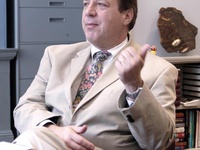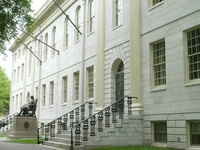The press release in which Kirby announced the restructuring framed the move in the context of the upcoming curricular review, set to come fully underway next year.
Although it states that the merger of the positions is intended to bridge the administrative gap between academic and student life, it’s more likely that Summers and Kirby didn’t want such a comprehensive and far-reaching review of the undergraduate experience to be heavily influenced by someone with priorities at odds with their own.
Under One Roof
But the motivation underlying the restructuring is likely more nuanced than simply a battle of personalities or a convenient pretense for ousting Lewis.
If Lewis’ departure had been Summers’ and Kirby’s chief goal, they could have accomplished that end more easily than through an overhaul of the administration.
Moreover, despite the uncertain reasoning behind the move, restructuring may actually help clarify administrators’ roles and improve efficiency within University Hall, namely, by unifying oversight of all student affairs.
“A lot of deans have thought about it and haven’t done it,” Kirby says of the restructuring. “We need an office to address both sides of the undergraduate experience.”
The position that became known as dean of undergraduate education was created in 1972, shortly after Warren Professor of American History Ernest R. May finished his stint as the final Faculty member before Lewis to serve as dean of the College.
Henry A. Rosovsky, dean of the Faculty at the time, wanted a professor to oversee curricular matters, so he created the separate, part-time post, and he intended it to be filled exclusively by Faculty members. Knowles gave the position the name it bears today.
Currently, the dean of undergraduate education oversees student academic life, sitting on several policymaking committees and vetting proposals for changes to the curriculum and concentrations. The dean also serves ad hoc roles for the needs of the dean of the Faculty.
While the dean of the College is responsible for many elements of the academic side of students’ lives, the position’s jurisdiction also includes monitoring the extracurricular and leisure time of College students.
Between the two offices, there is a nebulous region of unassigned responsibilities, including the Core Curriculum, advising and House life.
The Lewis-Maull report states that the poorly delineated responsibilities of the two offices have led to oversight problems and a disconnect between the administration and various aspects of the University.
And while some of these concerns were resolved by Lewis himself during his tenure, several administrators and Faculty members argue that the dean merger will help in terms of administrative efficiency and service to the undergraduate community.
Echoing the warnings of the report he co-authored, Lewis says that “the edges [between the two deanships] were never even that clear some of the time,” noting his initiative last year to raise the Advanced Placement score requirements for advanced standing, a move that technically falls under the jurisdiction of the dean of undergraduate education.
Read more in News
Pataki: 'Yale is Going to Crush Harvard'















